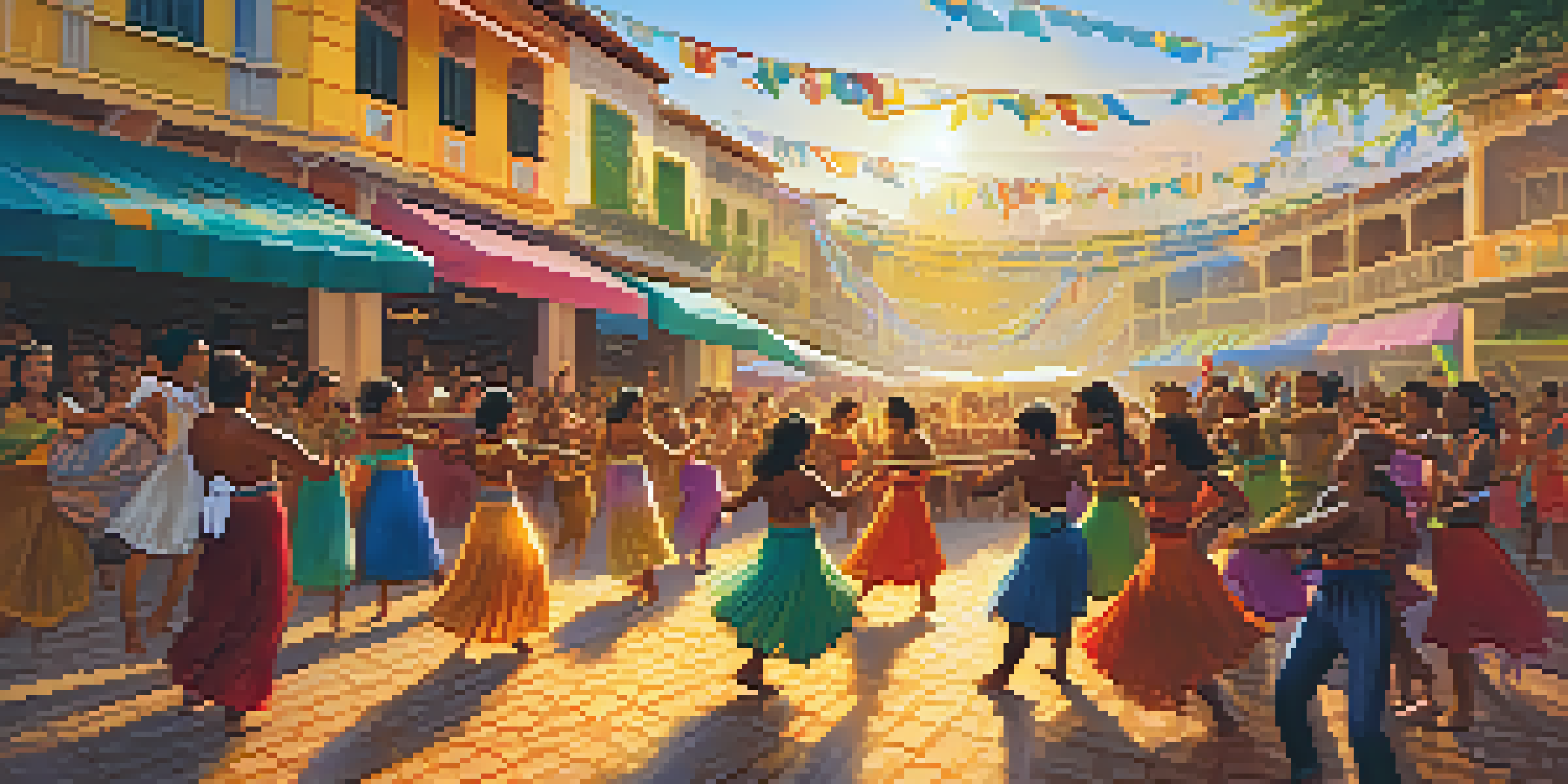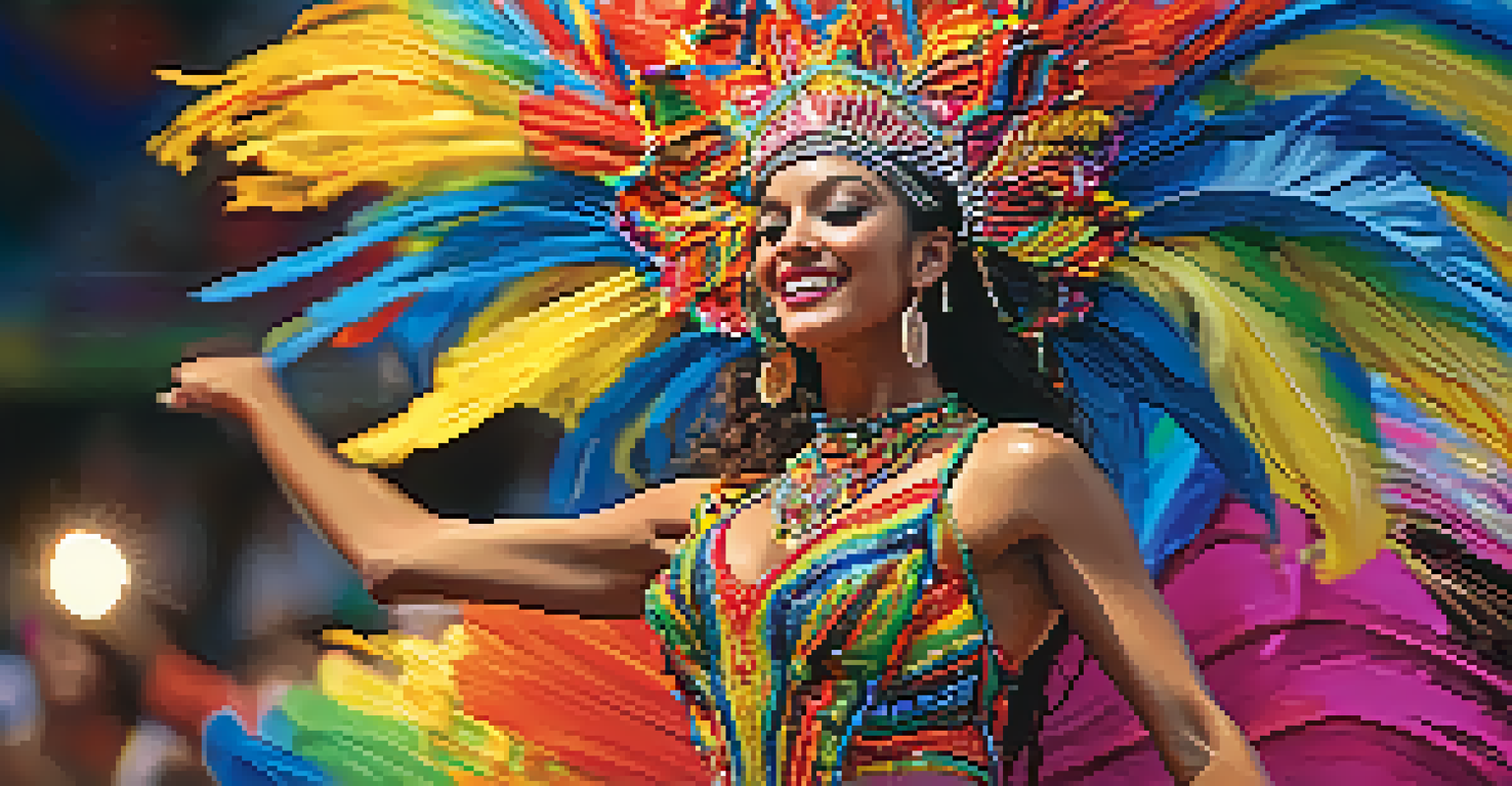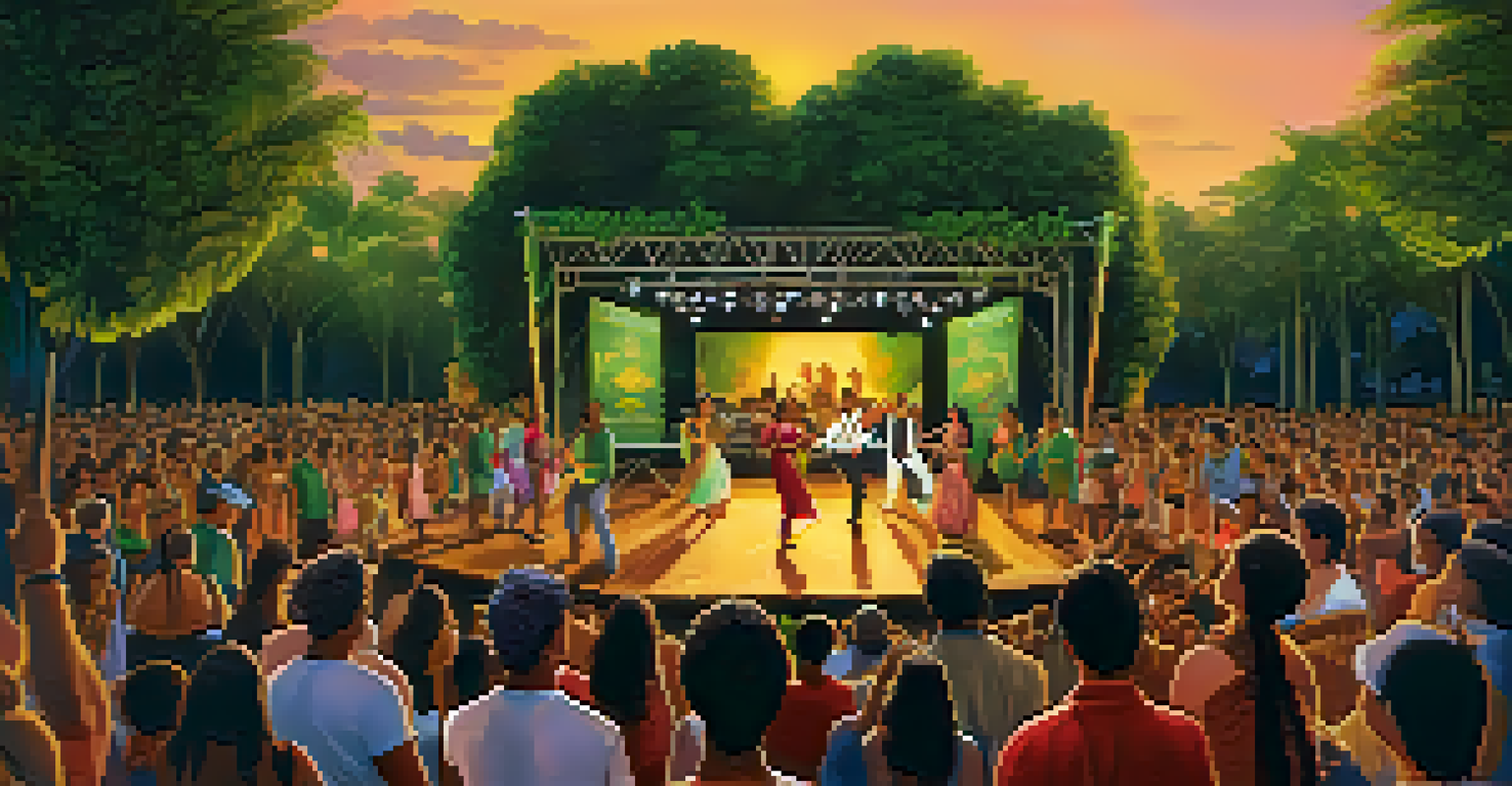The Role of Music in Brazilian Folklore Festivals and Traditions

The Heartbeat of Brazilian Culture: Music's Significance
Music is the heartbeat of Brazilian culture, infusing energy and emotion into everyday life. In folklore festivals, it serves as a vital connector, bringing together communities to celebrate shared histories and values. From samba to forró, each genre reflects the diverse roots of Brazil's people, creating a tapestry of sound that resonates across generations.
Without music, life would be a mistake.
These musical forms are not just entertainment; they encapsulate stories, legends, and rituals passed down through time. For instance, the rhythms of candomblé music are deeply tied to African heritage and spiritual practices, illustrating the enduring influence of African culture in Brazil. This connection to the past is what makes music a powerful tool for cultural preservation.
Moreover, music often acts as a catalyst for social change, giving voice to the marginalized and highlighting issues within society. Festivals become platforms for expression, where artists can address topics like inequality and identity through their lyrics and performances, making music an essential part of Brazil's folklore landscape.
The Instrumental Ensemble: A Blend of Tradition and Innovation
In Brazilian folklore festivals, traditional instruments like the berimbau and pandeiro come together with modern sounds to create a unique musical experience. This blend showcases the evolution of Brazilian music, where age-old rhythms intermingle with contemporary influences. For example, artists may incorporate electronic elements into traditional styles, making the music accessible to younger audiences.

The use of regional instruments also highlights Brazil's rich cultural diversity. Each region boasts its own musical traditions, such as the accordion in the northeast or the guitar in the south, allowing audiences to experience a microcosm of the country's varied heritage. This variety not only enriches the festival atmosphere but also promotes regional pride.
Music as Brazil's Cultural Heartbeat
Music serves as a vital connector in Brazilian culture, reflecting diverse roots and preserving shared histories through folklore festivals.
As musicians continue to innovate, they draw inspiration from both local and global influences, ensuring that Brazilian folklore music remains dynamic and relevant. This evolution keeps the spirit of these traditions alive while also inviting new interpretations, reinforcing the idea that music is always a living, breathing art form.
Dance and Music: A Symbiotic Relationship in Festivals
In Brazil, music and dance are inseparable, especially during folklore festivals. The rhythms dictate the movements, and dancers often express the stories told through the songs. For instance, the lively steps of samba are perfectly synchronized with its infectious beats, creating a visual spectacle that captivates audiences.
Music can change the world because it can change people.
This symbiotic relationship goes beyond mere performance; it's a communal experience. When people gather to dance, they forge connections with one another, breaking down barriers and fostering a sense of unity. The participatory nature of these festivals invites everyone to join in, regardless of skill level, highlighting the joy of collective celebration.
Moreover, dance serves as a powerful form of storytelling. Each movement can convey emotions, cultural narratives, and even historical events, making the performance a rich tapestry of expression. This interplay between music and dance enhances the overall experience, ensuring that folklore festivals are not just events but celebrations of life and culture.
Folklore Festivals: A Showcase of Regional Diversity
Brazil is a vast country with a multitude of cultures, and folklore festivals are a celebration of this diversity. Each region presents its own unique musical styles and traditions, allowing visitors to experience the rich cultural mosaic of Brazil. For instance, the Festa Junina in the northeast features traditional forró music and dance, while the Parintins Folklore Festival in the Amazon showcases the region’s indigenous influences.
These festivals serve as an opportunity for local communities to preserve and promote their cultural heritage. Through music, they can share their stories and traditions with a broader audience, ensuring that their unique identities remain vibrant. This preservation is crucial in a rapidly changing world, where globalization can sometimes overshadow local customs.
Dance and Music Unite Communities
The inseparable bond between dance and music during folklore festivals fosters unity and collective celebration among participants.
Additionally, the festivals often encourage collaboration among different cultural groups, leading to the creation of new musical fusions. This not only enriches the local culture but also fosters a sense of solidarity among diverse communities. Ultimately, folklore festivals highlight the beauty of Brazil's regional diversity through the universal language of music.
Cultural Identity: Music as a Reflection of Brazilian Heritage
Music in Brazilian folklore festivals acts as a powerful reflection of cultural identity. It showcases the stories, struggles, and triumphs of a people, deeply interwoven with their historical context. The rhythms and melodies often resonate with themes of resilience, love, and community, creating a sense of belonging among participants.
For many, engaging with these musical traditions is a way to connect with their roots. As generations pass down songs and dances, they reinforce cultural ties that might otherwise fade away. This connection is particularly significant for younger Brazilians, who may seek to understand their heritage in a modern world that often feels disconnected from the past.
Moreover, music serves as a form of resistance against cultural homogenization. By celebrating their unique sounds and traditions, communities assert their identity and heritage, fostering pride and unity. In this way, Brazilian folklore music becomes more than just art; it’s a vital expression of who they are.
Music Education: Nurturing the Next Generation of Folklore Artists
Music education plays a crucial role in ensuring the continuation of Brazilian folklore traditions. Schools and community programs often incorporate traditional music into their curricula, providing students with the opportunity to learn about their cultural heritage. This education not only preserves musical styles but also instills a sense of pride in young people.
Workshops and festivals often include mentorship opportunities where seasoned musicians share their knowledge with aspiring artists. This hands-on experience is invaluable, as it bridges the gap between generations and fosters a community of support. For many young musicians, learning the traditional way ignites a passion for preserving their cultural identity.
Global Impact of Brazilian Folklore
Brazilian folklore music has transcended borders, influencing global artists and promoting cultural appreciation worldwide.
Additionally, music education promotes creativity and self-expression, empowering the next generation to innovate within the genre. As they blend traditional elements with their own experiences, they create new forms of music that reflect contemporary realities. This evolution ensures that Brazilian folklore continues to thrive while honoring its roots.
The Global Influence of Brazilian Folklore Music
Brazilian folklore music has transcended borders, influencing artists and genres worldwide. The infectious rhythms of samba, for example, have inspired numerous international musicians, leading to collaborations that blend diverse musical styles. This global reach not only showcases Brazil's rich cultural heritage but also enriches the global music landscape.
As Brazilian artists gain recognition on the international stage, they often incorporate their folkloric roots into contemporary music. This fusion creates a dialogue between cultures, promoting understanding and appreciation for Brazil's diverse traditions. Festivals around the world now celebrate Brazilian music, bringing its vibrancy to audiences far and wide.

Moreover, the global interest in Brazilian music has led to a resurgence of local pride among musicians. As they share their cultural heritage with a broader audience, they reaffirm the importance of their traditions. This exchange of ideas and sounds ultimately enriches both Brazilian folklore and the global music community.